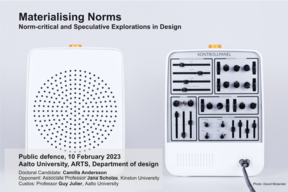Public defence in Design, MArch Camilla Andersson

When
Where
Event language(s)
MArch Camilla Andersson will defend the thesis "Materializing Norms. Norm-Critical and Speculative Explorations in Design" on 10 February 2023 at 12:00 in Aalto University School of Arts, Design and Architecture, Department of Design, in lecture hall M1, Otakaari 1, Espoo.
Opponent: Prof. Jana Scholze, Kingston University, UK
Custos: Prof. Guy Julier, Aalto University School of Arts, Design and Architecture, Department of Design
The public defence will also be organized via remote technology. Follow defence: https://aalto.zoom.us/j/63513335296
Zoom Quick Guide: https://www.aalto.fi/en/services/zoom-quick-guide
Thesis available for public display at: https://aaltodoc.aalto.fi/doc_public/eonly/riiputus/
Doctoral theses in the School of Arts, Design and Architecture: https://aaltodoc.aalto.fi/handle/123456789/54
Public defence announcement:
The focus of the thesis is the emerging field of norm-critical design. Although this is a vibrant scene in Sweden there is a need for theoretical and methodological development as well as for empirical examples. The norm-critical perspective is explored for its potential to contribute to a more solid analysis of power in ‘critical design’ along with other vantage points, such as post- and decolonial, feminist and queer perspectives.
The thesis demonstrates, through empirical examples, how norm-critical research through design can be put to practice in institutions within which norms and consequential power structures thus can be identified, visualised and challenged. The Swedish institutions explored are part of a welfare system which is increasingly neoliberalising, and the empirical examples make visible how processes of firsting and othering are negotiating positions of privilege and of discrimination.
The theoretical contributions derived from Michel Foucault and norm-critical theory aim to facilitate analyses of power within organisations conceptualised as micro-governmental institutions constituting modern forms of power. A hybrid-methodology combining feminist sociological methods developed by Dorothy Smith with norm-critical research through design methods contributes to a methodological sensitising of power. Finally, the empirical examples illustrate how norm-critical design can be used to explore and map power within micro-governmental institutions, and how designed artefacts can be positioned as governmental apparatuses, thus exerting power. However, the examples also show how a norm-critically informed design process can produce counterstrategies and support the agency of those affected by power.
The empirical projects identify and materialise specific norms in particular organisations, however, a series of these kinds of investigations can build a larger image of the way power is exerted through the negotiation of norms in institutions in Western modernity. Norm-critical analysis of power is thus investigated as a way of building a more solid criticality in ‘critical design’. The thesis further suggests that the norm-critical analyses of power can be used both for norm-critical analyses of what is and speculative explorations of what if in order not to unthinkingly reproduce current discriminatory structures.
Contact information of doctoral candidate:
| andersson.camille@gmail.com | |
| Mobile | 0704857137 |






